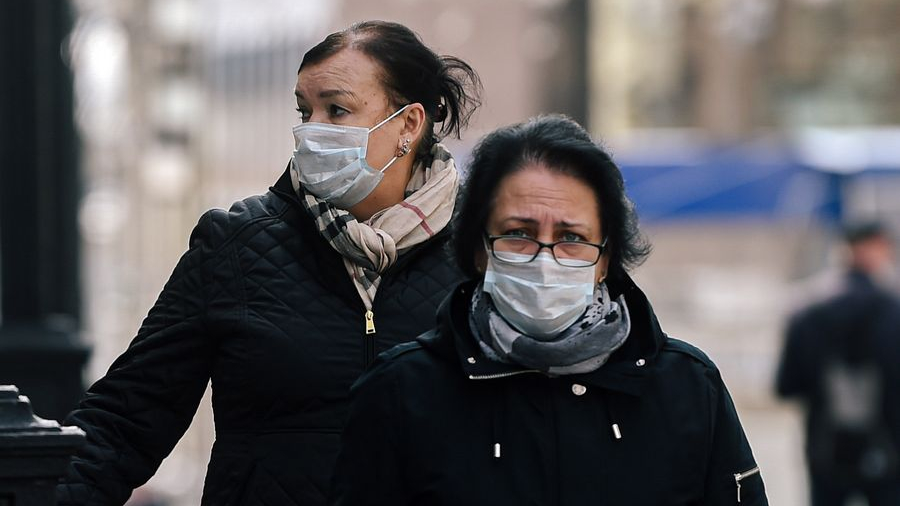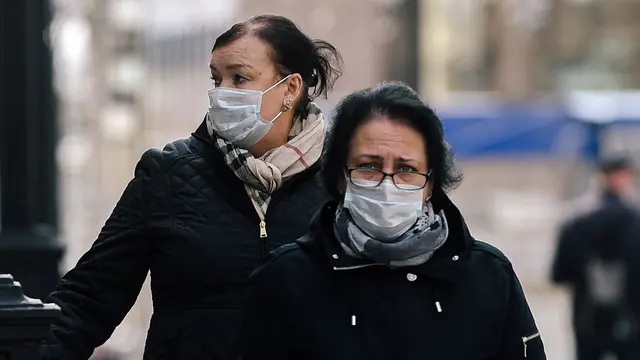
Women wearing face masks walk on a street in Moscow, Russia, April 30, 2020. /Xinhua
**Editors Note: **Stephen Ndegwa is a Nairobi-based communications consultant and international affairs columnist. The article reflects the author's views, and not necessarily those of CGTN.
By coincidence, May is the month for celebrating mothers, and the families they help procreate. This Sunday marks the International Mother's Day, an occasion that honors motherhood as a whole, and the influence of mothers in society.
Further, Mother's Day recognizes the strength of a woman as the pillar of society. Women's selfless efforts are usually taken for granted, as people have become accustomed to their traditional roles.
Midweek, on May 15, the world marks the International Day of Families. Endorsed by the United Nations, the 2020 theme is "Families in Development: Copenhagen Beijing+25," which is the 25thanniversary of the UN Fourth World Conference on Women.
The Conference, held in September 1995, sought "to advance the goals of equality, development, and peace for all women everywhere in the interest of all humanity." Indeed, the theme is apt, coming at a time when humanity is faced with a common challenge, the COVID-19 epidemic.
With statistics from a hospital in Wuhan showing that men count up to two-thirds of COVID-19 casualties, many women will be thrust into the frontline of eking out a livelihood for their families. The bread winning responsibility shared by deceased men will be now be borne solely by widows and single mothers.
Indeed, the family unit might never be the same again after COVID-19. Many families are going through trauma, including stigma and isolation from their communities.
But even with the extra burden cast by COVID-19, mothers themselves are being infected with the virus, resulting in added pressure as there might be no one to stand in for them during their indisposition.
And, with weak or overwhelmed healthcare systems in many countries, coupled with inability to meet the high cost demand for treatment of COVID-19 cases, the family could easily become a death trap.
The UN notes that, "It is the families who bear the brunt of the crisis, sheltering their members from harm, caring for out-of-school children and, at the same time, continuing their work responsibilities."
Also, as COVID-19 causes the destruction of national economies, leading to inevitable high rates of unemployment, the prospect of homeless families is an increasing reality.
Currently, thousands of families have become destitute after losing their source of income due to lockdowns, restrictions of movement, and social distancing.

A medical worker holds a newborn baby in the No. 6 Hospital of Harbin City, northeast China's Heilongjiang Province. /Xinhua
These frustrations have also increased cases of domestic violence in families, with mothers being the demographic hit most. Men who lived far away from their families are now forced by circumstances to stay home for inordinately long periods, escalating tensions the set up creates in many cases.
According to the UN Secretary-General's policy brief titled, "The impact of COVID-19 on women," across every sphere, from health to the economy, security to social protection, the impacts of COVID-19 are exacerbated for women and girls simply by virtue of their sex.
For instance, the UN says significant levels of lockdown-related disruption over six months could leave 47 million women in low- and middle-income countries unable to use modern contraceptives, leading to a projected sevenmillion additional unintended pregnancies. It could also result in an additional 31 million cases of gender-based violence.
The bad news for families looks even grimmer, with new revelations by a group of Chinese researchers who made the research during the peak of the epidemic at Shangqiu Municipal Hospital showing that coronavirus can exist in men's semen, even when the patient is in an advanced stage of recovery.
The team cautioned that, "Abstinence or condom use might be considered as preventive means for these patients. In addition, it is worth noting that there is a need for studies monitoring fetal development."
Further studies should be carried out to establish whether the virus could cause irreparable damage to men's reproductive health, especially sperm count and sperm quality.
If these results are widely established, it will definitely shake the foundation of the family unit by increasing the incidence of discordant couples.
Basically, COVID-19 is taking a heavy toll on humanity. With mothers as nature's nurturers and caregivers in families, their infection by the coronavirus will severely compromise the world's social order.
As some of the responses to mitigate the impact of the pandemic on women, UN Women Deputy Executive Director Anita Bhatia proposes that, among other measures, bailout and stimulus packages reflect an understanding of the peculiar circumstances women find themselves in.
Governments should also mainstream their decision-making role at all levels of social and economic recovery efforts.
Ultimately, Bhatia states that, "Policymakers must pay attention to what is happening in people's homes, and support an equal sharing of the burden of care between women and men."
(If you want to contribute and have specific expertise, please contact us at [email protected].)
 简体中文
简体中文




